Kenya


- NIMD in Kenya: At a glance
- What we do
- How we do it
- Meet the team
Main Objective
Bridging the gap between Kenya’s people, political parties and politicians.
Results
Our Democracy School and Academy equips participants with the tools and confidence to engage in politics and contribute meaningfully to their communities, fostering a diverse network of skilled and committed young people that transcends traditional political divides. This network is willing to work together to build trust in politics and respond to the needs of Kenya’s people.
Together with our SIDPAK partners, we support and train political party leagues for women, youth and people with disabilities to encourage parties to take steps toward greater inclusiveness. Among the many results, the ruling UDA party now includes leagues for women, youth and people with disabilities in its membership recruitment drives. Such actions are helping to build trust in the political system, showing citizens that parties are committed to representing the diversity of their voices.
NIMD and the Kenya Young Parliamentarians Association held a Youth Bunge Dialogue, a forum designed to bring young people and leaders together to co-create policies. Following the session, the Kenyan Parliament adopted a joint resolution from participants addressing inclusive political participation and environmental conservation—an important step toward integrating youth perspectives into legislative processes.
Kenya: Political background
Within East Africa, Kenya is recognized as a stable democracy and influential voice. However, within the country, political loyalties are often shaped by ethnic diversity, rather than policies or ideas. This ethnic-based alignment fuels polarization and keeps power concentrated among traditional elites.
Within this context, Kenya’s recent political developments have been marked by both tensions and reforms. The 2018 “handshake” between President Uhuru Kenyatta and opposition leader Raila Odinga marked a significant attempt to bridge divisions. Yet deep-rooted distrust between political factions remains. And the 2022 election, though peaceful, exposed ongoing concerns about political transparency and fair representation, especially among women, youth and other structurally excluded groups.
Addressing these divides – by building bridges both between political parties and between citizens and political leaders – is vital to building trust in the democratic process. Through greater connection and mutual understanding among all political actors, Kenya can foster the trust needed to deepen the inclusiveness and transparency of its democracy.
What we do
Building bridges between people is in our DNA at NIMD.
Indeed, since we started working in Kenya in 2003, our main focus has been fostering trust and supporting the political participation of structurally excluded groups.
Achieving this requires a comprehensive approach. We work, for example, to ensure diverse voices – such as those of young people, women and people living with disabilities – are taken into account. Because we know that trust in politics can only thrive when all groups are heard.
And we ensure that politicians are held accountable for their work and decisions, working alongside partners like Mzalendo, to ensure all Kenyans have access to valuable information about the institutions that govern them.
Lastly, we work on dialogue, helping disparate political movements find common ground so that they can work together in the interest of all Kenya’s people.
Trust in politics can only thrive when all groups are heard.
What we do: In numbers
How we do it
Responsive politics
In 2019, NIMD entered into a partnership with parliamentary support organization Mzalendo. Our collaboration focuses on increasing parliamentary transparency and openness by bringing people closer to their representatives.
Together, we support public participation; provide accessible online information on the performance and functioning of parliament; and advocate for transparency.
For example, MPs are can use Mzalendo’s social media platforms to explain their positions in specific debates, showcase their daily work, and discuss some of the challenges they face.
Alongside our work with MPs, NIMD and our partners also work with political parties and the Office of the Registrar of Political Parties – a regulatory body in Kenya responsible for overseeing the registration, regulation and compliance of political parties in line with the country’s legal framework. By providing training and support, we help these parties comply with laws on the representation of women, youth and people with disabilities.
Through all this work, we place a firm focus on transparency, accountability and inclusiveness, encouraging MPs and parties to act in line with the public’s needs. In turn, when people can see what their representatives are doing – how they represent their constituents and work to address their needs – trust in the political system grows. This trust makes citizens more likely to support parties and candidates based on their policies and ideals, rather than along ethnic lines, contributing to a more inclusive and issue-driven democracy.
Democracy education
At NIMD Kenya, Democracy Education forms a central part of our ambitions to foster trust across political divides.
Our Democracy School
NIMD Kenya’s Democracy School brings together young (aspiring) leaders from political parties, civil society organizations and academia, with a special focus on youth from under-represented groups and those living with disabilities.
During two intense six-day retreats, the participants learn from national experts on topics including leadership and ethics, Kenyan political history, and gender and inclusion. They gain important skills such as public speaking; dialogue and how to effectively communicate their agenda.
The learning trajectory also includes mentorship from influential figures and alumni. And the participants have the chance to engage in intergenerational dialogue with established politicians – an important opportunity to expand their networks and make their voices heard.
In common
What both our School and Academy have in common is a deep focus on building relationships between the participants. By building connections during their joint learning experience – and engaging in extra-curricular activities – the participants develop a sense of community.
So, despite their differences, our participants leave with enduring bonds, a commitment to respectful cooperation across divides, and a robust network of knowledgeable, capable and driven leaders. Together, they are united in their dedication to fostering a more inclusive and responsive democracy in Kenya.
By fostering political engagement and promoting democratic leadership, we equip these young leaders with the knowledge and skills needed to contribute effectively to political life; foster commitment to democratic values; and contribute long-term to positive change.
Our Democracy Academy
Like our Democracy School, NIMD’s Democracy Academy serves as a platform for promoting democratic values and honing the skills of its participants.
Through the Academy, we target Members of Parliament from across the political spectrum, particularly those representing structurally excluded groups, including women, youth, and people with disabilities.
These participants come together for six learning sessions. By providing an in-depth, sequential learning experience, NIMD aims to nurture their capacity to shape national policies and, consequently, the future of democracy in their countries.
"I want to leave the space I work in better than when I found it. "
Irene Mayaka, Member of the Kenya National Assembly, Participant of the Kenya Democracy Academy
Youth in politics
75% of Kenya’s population is younger than 35.
Yet, despite their numbers, Kenya’s young people face multiple barriers to participating in politics. These include stigma from party leaders and the high financial costs of political participation.
The result is disengagement from traditional politics—but not silence. While many young people are less willing to vote or run for office, they are becoming increasingly vocal online. Through informal channels, they are demanding change and making their voices heard in their communities and public life.
At NIMD, we strive to build bridges between the informal and formal spaces of politics. So that young people can continue to influence their communities, but can also choose to assert their undeniable right to participate in formal political structures.
We have run online campaigns to encourage young people to vote; and we collaborate with artists and influencers to engage youth through digital platforms. We also target youth through our Regional Bunges – training platforms that give young people a chance to learn about parliamentary processes and procedures; network with Members of Parliament; and co-create recommendations on issues affecting their counties
These efforts, alongside our Democracy Schools, aim to deepen participants’ skills and knowledge and widen their networks—so they can influence politics through both formal and informal avenues.
Women in politics
At NIMD, we firmly believe that the political participation of women, in all their diversity, is essential for any inclusive and responsive democracy. And we have a long history of supporting this goal.
In 2010, NIMD was part of a broad civil society coalition that successfully lobbied for a gender equality clause in Kenya’s new Constitution. This clause stipulates that at least one-third of the members of elective or appointive bodies must be women.
While this was a major victory, there is still a long way to go and NIMD remains committed to achieving more meaningful representation for women. We ensure, for example, that women and other structurally excluded groups are represented in our Democracy Schools, gaining the knowledge and skills they need to make their mark on politics.
But our work also aims to ensure that the topic remains on the political agenda. So that politicians have the information and motivation needed to break down cultural and systemic barriers to women’s political participation.
For example, our 2021 study into the cost of entering politics, conducted in partnership with Westminster Foundation for Democracy, exemplifies practical barriers to women’s political participation. And our Walk the Talk report assesses the extent to which the legal framework governing Kenya’s political parties supports the inclusion and participation of women, youth and people living with disabilities.
These studies serve as an important tool to lobby, inform the debate and instigate change among politicians and within political institutions.
"The political participation of women, in all their diversity, is essential for any inclusive and responsive democracy. "
Dialogue
In 2023, large-scale protests erupted across Kenya, fuelled by rising living costs and political dissatisfaction. In response, members from both parliamentary coalitions formed a national dialogue committee to address these issues, opening up broader discussions on reforms.
In this context, NIMD began supporting the Political Parties Liaison Committee – a platform that brings together representatives from all political parties and key electoral bodies. Through this platform, NIMD fosters the dialogue and collaboration vital for bridging the gap between parties, fostering mutual understanding, and creating a foundation for constructive, inclusive political reforms.
These efforts to promote trust and connection are further reinforced through our multistakeholder dialogues – which bring together politicians, citizens and civil society to build consensus and collaboration across divides. By bringing together voices from across society, our dialogues help to bridge divides, nurture a culture of consensus and collaboration, and lay the groundwork for inclusive, issue-based policies that strengthen Kenya’s democracy.
Meet the team
 Ronnie Ojwang
Country Director, NIMD Kenya
Read more
Ronnie Ojwang
Country Director, NIMD Kenya
Read more
Get in touch directly with NIMD Kenya via nimdkenya@nimd.org
Ronnie Ojwang is the Country Director for the NIMD office in Kenya. He has over 12 years of experience in political party development, civil society strengthening, youth inclusion, preventing and countering violent extremism, research, media and strategic communication. He has worked and consulted for a number of international organizations including the National Democratic Institute, UNDP Kenya, BBC Media Action, Mercy Corps and DAI Global in Kenya and the Horn of Africa region.

Get in touch directly with NIMD Kenya via nimdkenya@nimd.org
Ronnie Ojwang is the Country Director for the NIMD office in Kenya. He has over 12 years of experience in political party development, civil society strengthening, youth inclusion, preventing and countering violent extremism, research, media and strategic communication. He has worked and consulted for a number of international organizations including the National Democratic Institute, UNDP Kenya, BBC Media Action, Mercy Corps and DAI Global in Kenya and the Horn of Africa region.
Who we work with

Our long-standing partner in Kenya, Mzalendo Trust is a non-partisan parliamentary support organization that aims to facilitate public participation in parliamentary processes through information sharing, research and networking.

NIMD’s work in Kenya is funded by the Dutch Ministry of Foreign Affairs under the Power of Dialogue programme. The Power of Dialogue consortium is made up of NIMD, Gorée Institute, Akina Mama wa Afrika, and Centre des Études Méditerranéennes Internationales, and seeks to enhance collaboration of political and civic actors to participate in accountable political processes.

NIMD is a proud member of the SIDPAK Consortium. The Consortium helps contribute to the development of inclusive and democratic political actors in Kenya and is funded by the European Union. Other members in the Consortium are DIPD, the Oslo Center, Mzalendo and CMD-Kenya.

The WYDE Civic Engagement project is a component of the Youth and Women in Democracy Initiative (WYDE) by the European Commission. WYDE is powered by the European Union and the European Partnership for Democracy. NIMD’s partners for WYDE are Westminster Foundation for Democracy and Demo Finland.

 X
X